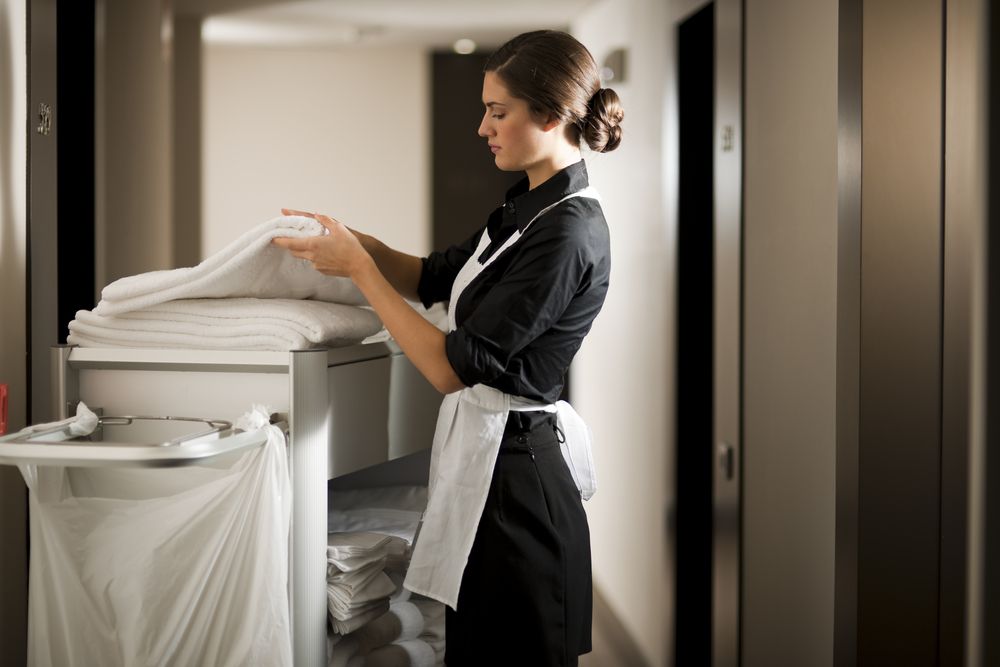From Hotel Workers to Drivers, Employees Demand On-the-Job Security
Workers in a wide variety of fields are asking their employers to bolster workplace safety measures, and with good reason. The workplace can be a...
3 min read
 Craig Badrick
:
Jan 22, 2018 7:59:00 AM
Craig Badrick
:
Jan 22, 2018 7:59:00 AM
Hospitality workers are subjected to an inordinate amount of sexual harassment and abuse, which is why many hotels are starting to provide panic buttons to every employee.
Hospitality workers like room attendants, room-service waiters, and minibar attendants are particularly vulnerable to harassment. That should come as no surprise, as their day-to-day jobs include many of the factors (language differences, an emphasis on customer satisfaction, physical isolation) that the Equal Employment Opportunity Commission says create the ideal conditions for unwelcome advances.
According to a survey conducted by Chicago-area union UNITE HERE Local 1, 49% of housekeepers reported an incident where a male guest either answered his hotel room door naked or exposed himself to the respondent after she had entered the room. An even larger portion (58%) of female housekeepers reported being sexually harassed by guests, including (but not limited to) episodes in which they were inappropriately touched, cornered, or shown sexual material they did not wish to see.
Concerningly, the survey also found that only 33% of victims had reported guests’ wrongdoing to their supervisor. That’s largely due to the fact that hotel management has a strong incentive to side with guests, and thus often finds itself caught between a rock and a hard place dealing with worker complaints that typically can’t be supported with hard evidence.
“Minus video surveillance, there is often no evidence of an altercation occurring in an isolated floor of a hotel. No witnesses. Just the word of the victim against the offender guest,” explains Chicago Alderman Edward Burke. “Who does the hotel manager believe when a complaint is filed — a powerless employee or the executive paying hundreds of dollars in room charges with a corporate platinum American Express card?”
Fortunately, growing legal and political pressure in recent years has provided hope for some groups of beleaguered hospitality workers. In October, California’s Fourth District Court of Appeal ruled that a housekeeper could bring a claim against her employer after she was raped by a trespasser of whom hotel management was aware. “If an employer knows a particular person’s abusive conduct places employees at unreasonable risk of sexual harassment,” the decision reads, “the employer cannot escape responsibility to protect a likely future employee victim merely because the person has not previously abused that particular employee.”
In order to satisfy their legal responsibility to protect them from sexual harassment and abuse, hotels in many cities have started providing their employees with compact, portable panic buttons not unlike those commonly worn by senior citizens with health concerns. After New York City passed legislation in 2012 requiring all housekeepers working in unionized hotels to carry a panic button, Assemblyman Rory I. Lancman commented, “[They’re] a very cost-efficient and simple way to keep hotel workers safe.”
A survey conducted by Puget Sound Sage suggests that a vast majority of housekeepers agree with Lancman, as 95% of respondents reported that they would feel safer entering occupied guest rooms if they were equipped with a panic button. A housekeeper at a Chicago-area hotel told the Chicago Sun-Times that “having a panic button would make me feel safer. To know I could easily call for help if something happens would be such a relief.”
Panic buttons don’t just give hospitality workers the ability to summon assistance when needed — they also provide a disincentive for harassers and abusers. Many hotels post conspicuous notices in every room that inform guests that every hotel employee is equipped with a panic button. Though it’s difficult to measure the precise impact of this kind of “neighborhood watch effect,” it gives housekeepers considerable peace of mind. “[If] the guests know that we’re carrying a panic button…they’ll probably think twice if they’re trying to do anything bad,” posits Nuris Deras, an employee of the Loyal Inn in Seattle.
Chicago, Seattle, and a smattering of other cities nationwide are in the process of following New York’s lead, and a number of hotels are choosing to invest in panic buttons before they are legally mandated. This represents encouraging progress, and companies in every industry should take note of the benefits panic buttons have delivered to hospitality workers.
From lab workers and salespeople to maintenance workers and nurses, professionals in a wide variety of fields are often expected to complete their work either in the company of strangers or in total isolation. Ensuring the safety and security of these lone workers is both essential and challenging.
As such, employee-minded companies often choose to invest in lone worker alarm systems like the TTI Guardian. Not only does this cutting-edge system guarantee that isolated workers can request assistance with the push of a button, it also includes “man down” and “no-response” features that will notify supervisors of an issue when a worker is unable to signal for help.
Do you employ workers who operate in isolation or other hazardous conditions on a regular basis? Request a quote for lone worker security alarms today.

Workers in a wide variety of fields are asking their employers to bolster workplace safety measures, and with good reason. The workplace can be a...

NJ S.2986 becomes effective on January 1st, 2020, which means hotels need to start installing duress alarms today. Here’s what you need to know: This...

Today’s threats are growing by the moment. A wireless society means that more workers are doing their jobs remotely, while incidents of violence and...